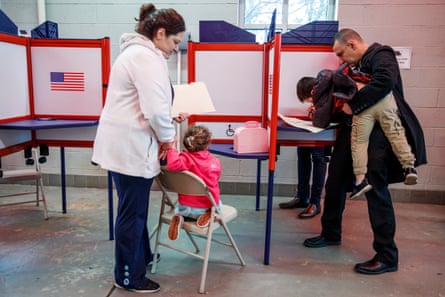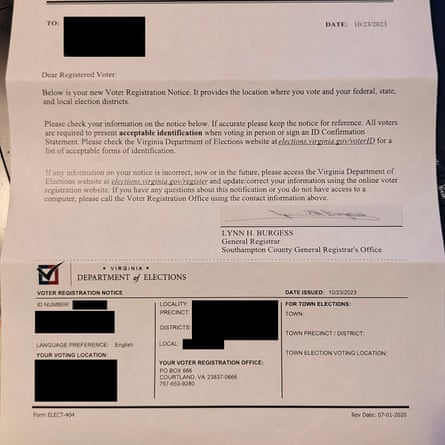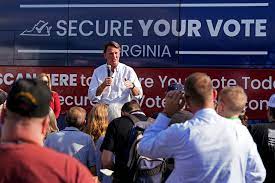Voting rights groups decry error days before elections that will determine which party controls the state legislature
Virginia election officials wrongly removed almost 3,400 eligible voters from the state’s voter rolls, a significant error that has caused alarm among voting rights groups just days before critical state elections that will determine which party controls the state legislature.
Officials announced the number of voters affected by the purge on Friday – more than 10 times the number of people they had initially said were affected. Macaulay Porter, a spokesperson for the governor, Glenn Youngkin, had told the Washington Post on 6 October that at least 270 people had been wrongly removed and that officials didn’t expect that number to rise much. Officials declined to provide updates on the number affected until Friday, when they announced that the actual number was “nearly 3,400” (they did not provide an exact figure). VPM, Virginia’s NPR affiliate, first reported on the issue in September.
All of the people who were removed had a prior felony conviction but had had their rights restored by the governor. Virginia has long stripped anyone convicted of a felony of their voting rights and is one of three states that gives the governor the sole authority to restore them. Nearly 102,000 people can’t vote in Virginia because of a felony conviction, according to an estimate by the Sentencing Project, a criminal justice non-profit. Nearly two-thirds of those are on probation.
Earlier this year, Virginia announced it had identified 10,558 people who had had their rights restored but had subsequently committed a new felony. That data wasn’t accurate. The Virginia state police, which had been supplying the data to the state, had been wrongly flagging people as having committed a new felony if they had received a technical violation of their probation – something like failing to show up for a meeting or failing a urine test.
Tonya Jones, 59, lives in Highland Springs, near Richmond, the state capitol. On 1 September, the local registrar sent her a letter saying she had been removed from the rolls because of a new felony conviction. Jones thought the letter was a “trick” because she had been regularly voting since getting her rights restored in 2019 and had even served jury duty. She had been convicted of a drug-possession felony in 2017 or 2018, but completed drug court and hadn’t had any new convictions.
When early voting began this fall, she tried to cast a ballot and was told her name wasn’t on the rolls. “I was very upset because I knew that my rights were restored,” she said. “My life is turned around and I’m like, ‘What in the world are they talking about?’”
She called two of the numbers that were on the notice she had received. She couldn’t get through to anyone at the first number, she said, and the second person advised her to start the process of getting her voting rights restored again. She said she finally spoke with someone at the state police who said she had been wrongfully removed and helped her get back on the rolls.

Galen Baughman, who was convicted of a sex-related offense as a teenager and has become a well-known activist on issues around sex offenders, was also affected. He had his voting rights restored by then governor Ralph Northam in May of 2021 and had been voting ever since. When he showed up to vote in Virginia’s primaries earlier this year, he found out he had been removed from the rolls.
“I know that people have been literally put in handcuffs for trying to vote. I’ve had enough handcuffs in my life – I didn’t want to have that experience again,” he said.
Baughman followed up with the local registrar, who informed him that he had been removed because records showed he had committed a new felony, according to a letter Baughman provided to the Guardian. The “new felony” actually was a probation violation for being kicked out of a treatment program, according to court documents and an official criminal history record. He eventually went to court and got a judge to order the registrar to restore him to the rolls.
Virginia’s department of elections said on Friday that nearly all those affected had been reinstated and were receiving notification. Voting rights groups, who have spent weeks pressing the state for more information, are concerned there will still be confusion and want assurances there aren’t more affected voters.
“If you are somebody who has had their rights restored and you’re unsure whether you’ve been affected or not, there’s just such [a] chilling effect,” said Tram Nguyen, the co-executive director of New Virginia Majority, a non-profit civic engagement group.
Democratic members from Virginia’s congressional delegation called on the justice department to investigate the matter. A justice department spokesperson declined to comment on the request. Porter, the governor’s spokesperson, referred questions to the Virginia department of elections, which did not respond to a request for comment. Youngkin has asked Virginia’s inspector general to investigate the issue.
“We really have no way to know if 3,400 is accurate,” said Shawn Weneta, a policy and advocacy strategist at the Virginia chapter of the American Civil Liberties Union. “The administration still is refusing to be transparent with voters about how it happened.”
It’s also unclear what information the state is providing to voters to explain the issue. Weneta provided a letter to the Guardian that was sent to one person who was wrongly removed that informed him he was newly registered to vote with no explanation of why he had been removed.

Making sure those affected receive a thorough explanation is critical. When someone is removed, they typically receive a letter from election officials informing them of the reason they’re being removed. Even though Virginia has same-day registration, people who show up at the polls and find out they have been purged might not have all the information they need to register on the spot, said Sheba Williams, who runs Nolef Turns, a group that advocates for people with felony convictions.
“The reality is we are now eight days away from an election and many of these voters likely received a letter from their registrar … saying that their voting rights had been revoked,” Aaron Mukerjee, an attorney who is leading voter-protection efforts for the Democratic party of Virginia, said on Monday. “This is all a bit too late. The deadline for requesting an absentee ballot has already passed. The deadline to register without having to do same-day registration has already passed.”
